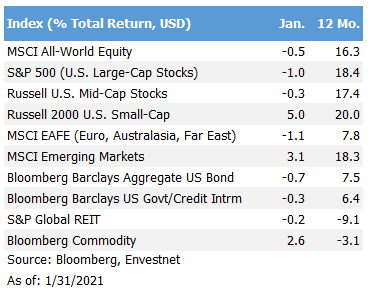Reddit Rebellion
Following a bizarre year, 2021 is attempting to outdo its predecessor. January might as well have been the 13th month of 2020. Between a Senate runoff in Georgia, an unsettling insurrection in Washington, and a social-distanced Presidential inauguration, there was a lot to focus on. But none of these events captivated market-watchers like the frenzied trading in GameStop.
The confrontation between a merry band of anonymous retail traders armed with low-cost trading apps and Reddit accounts sized up a few hedge funds with short positions in GameStop, a fledgling brick-and-mortar video game retailer. In what is known as a “short squeeze,” these retail traders put intense pressure on hedge funds that were betting that the company’s shares would fall.[1]
Is this some sort of new investing phenomenon? Not really, but it does point to a rise in a new class of investors supported by the emergence of low-cost trading platforms and new communication tools. In some ways, it might be considered a step toward the democratization of finance, but this may have gone too far in the GameStop case. It is more accurately viewed as the gamification of the stock market by a group of younger, tech savvy investors. A new generation of investors is not a bad thing, even if they enter investing in nontraditional ways.
This type of short squeeze activity is not uncommon; however, in the past, it has usually been one hedge fund versus another. It is entertaining but will likely end badly for those late to the party, an inevitable finale that is already playing out. GameStop shares started the year at $18.84, reached a high of $483 on January 28, and trades around $64 as we write – a wild ride, to put it mildly.
Meanwhile, the S&P 500 started the year down 1.1%, and global stocks declined 0.5%. Energy gained 3.6% after a tumultuous 2020 as the global recovery moves forward. Consumer staples finished down 5.2% as higher inflation expectations weighed on the sector, and investors eye more cyclical industries.
Shares of small companies and emerging market stocks finished up 5.0% and 3.1%, respectively. These segments continue to benefit from a global recovery and attractive relative valuations. Namely, emerging markets have benefited from China’s resilient growth during the pandemic.
Interest rates rose during the month on expectations that inflation will return due to a fiscal stimulus boost while the Fed stays put on short-term rates. The 10-year U.S. Treasury started the month at 0.92%, rising to 1.14%, before settling at 1.09%. The Barclays Aggregate finished down 0.7%.
Going forward, markets will continue to focus on the major macro narratives - monetary policy, fiscal stimulus, and COVID developments.
At the latest FOMC meeting, Jerome Powell reiterated the Fed’s support for the U.S. economy. The Federal Reserve will keep its main interest rate close to zero and will keep asset purchases steady for the time being, while expressing a higher tolerance for inflation as the economy continues its recovery.
The U.S. economy continues its climb back to pre-pandemic levels, and fiscal stimulus remains an important component. Newly-inaugurated President Joe Biden continues to advocate for an aggressive $1.9 trillion coronavirus relief package. There appears to be bipartisan support; however, the size and scope of the bill remains in question.
Markets continue to look ahead to a full recovery as COVID cases have started to decline from record highs in the middle of January and vaccines continue to rollout. However, we are not out of the woods yet. Variants continue to present themselves, and vaccine rollout has hit some roadblocks. The race between the new variants and vaccines will determine the remaining course of the pandemic.
WHAT IT ALL MEANS
The push and pull of Reddit users facing off against Wall Street has made for great drama in a time where traditional entertainment – movie-goings, sporting events and concerts – have been absent. Timing these trades can be frustratingly elusive, unproductive, and unprofitable over the long-term. Investing success comes from constant exposure to the broad financial markets, participating in economic growth and profitability of a wide collection of companies.
After an unexpectedly good year in the midst of an enormous world health crisis, investors should be prepared for market volatility as news on the pandemic, and efforts to combat it, swing from optimistic to daunting, and back again. We continue to emphasize good planning, appropriate asset allocations, and enduring faith that there is increasing light at the end of this long tunnel.
[1]To short a stock, or bet on its decline, an investor borrows shares from a broker and sells them. If the stock drops in price, the investor can buy back the shares in the open market and return them to the broker, locking in a profit. But if the shares go up, the investor has to buy back the shares to limit their losses. This “buying to cover” can drive up the prices still higher, forcing more short covering and further price appreciation. This is essentially what happened with GameStop shares.
Contact us at 865-584-1850 or info@proffittgoodson.com
Please see disclosures


